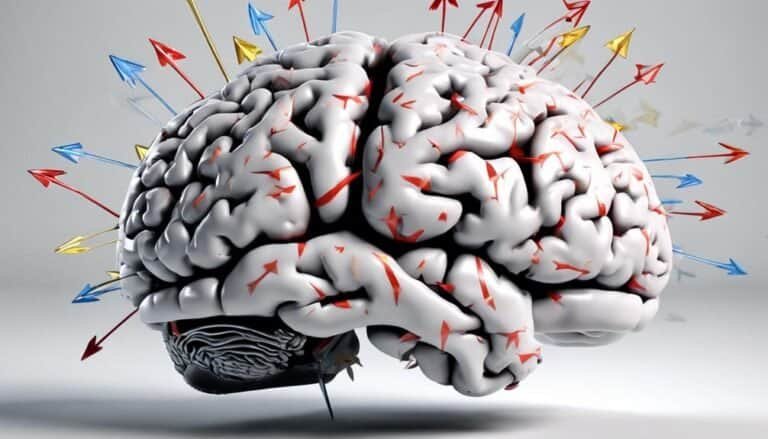Exploring the Depths of Transpersonal Psychology
“The self is not something that one finds. It is something that one creates.”
– Thomas Szasz
Welcome to the realm of transpersonal psychology, where the boundaries of the self are expanded and the connection to higher consciousness is explored. In this fascinating field, we delve into the depths of spiritual psychology, consciousness studies, and holistic healing to uncover the transformative power of the transpersonal self.
Key Takeaways:
- Transpersonal psychology focuses on the spiritual and transcendental aspects of the human experience.
- Self-actualization is the ultimate goal of human development in transpersonal psychology.
- Various approaches, such as meditation and transpersonal psychotherapy, can facilitate self-actualization.
- Transpersonal psychology offers a unique perspective on mental health and well-being.
- The concept of the self in transpersonal psychology goes beyond the ego and explores higher levels of awareness.
Transpersonal Psychology and the Quest for Self-Actualization
In the realm of psychology, self-actualization is often regarded as the pinnacle of human development. However, transpersonal psychology offers a unique perspective, going beyond the traditional notions of positive self-esteem and autonomy. It delves into the connection between the self and higher consciousness, emphasizing the transcendental aspects of the human experience.
One of the key figures in the development of transpersonal psychology is Abraham Maslow, known for his hierarchy of needs and his groundbreaking work on self-actualization. Maslow believed that reaching self-actualization allows individuals to cultivate their full potential and live a meaningful life.
Transpersonal psychology challenges the view of the self from a traditional perspective. It acknowledges that humans are more than just ego-driven individuals. Instead, they have the capacity to go beyond individual concerns and connect with a greater source of being.
Ken Wilber and the Stages of Human Development
One influential theory in transpersonal psychology is Ken Wilber’s stages of human development. Wilber proposes a model that encompasses various stages of consciousness. According to his theory, self-actualization is just one stage in the journey towards higher states of awareness and consciousness.
| Stage | Description |
|---|---|
| Egocentric | Self-centered perspective, limited awareness |
| Ethnocentric | Identification with a particular group or culture |
| Worldcentric | Recognition of interconnectedness and global perspective |
| Kosmocentric | Transcendence of individual concerns, connection to the cosmos |
Wilber’s model highlights the importance of expanding one’s consciousness beyond the limitations of the ego, leading to a deeper understanding of the interconnectedness of all things.
Transpersonal psychology challenges traditional psychology’s emphasis on individual identity and autonomy, inviting individuals to explore the depths of their being and find connection with something greater. It is a call to transcend the confines of the ego and embrace a transpersonal perspective.
Stanislav Grof and Self-Transcendence
Another influential figure in transpersonal psychology is Stanislav Grof, who explored the realms of consciousness and the therapeutic benefits of self-transcendence. Grof suggests that self-transcendence can lead to profound transformations and healing.
Grof’s research, particularly on psychedelic substances, highlights the potential for individuals to venture beyond their ordinary states of consciousness. These altered states often provide glimpses of the transpersonal dimensions of existence, revealing new insights and perspectives.
Transcending Traditional Psychology
Transpersonal psychology offers a paradigm shift, transcending the limitations of traditional psychology. It recognizes that self-actualization involves more than just individual well-being and personal achievement. It encompasses a deeper quest for meaning, connection, and spiritual growth.
By embracing a transpersonal perspective, individuals can embark on a transformative journey towards self-actualization. This journey involves exploring the depths of consciousness, expanding awareness, and ultimately finding a sense of purpose and fulfillment in life.
The image above visually captures the essence of transpersonal psychology and the quest for self-actualization. It represents the interconnectedness of individuals with higher consciousness, symbolizing the transformative journey towards wholeness.
Transpersonal Approaches to Self-Actualization
Transpersonal psychology offers various approaches to self-actualization. Through these practices, individuals can embark on a transformative journey of personal growth and spiritual development.
Cultivating Present Moment Awareness
Meditation and mindfulness practices are powerful tools for self-actualization. By engaging in these practices, individuals can cultivate a deep sense of present moment awareness, allowing them to connect with their inner selves and tap into the transcendent. These practices teach individuals to observe their thoughts and emotions without judgment, fostering a greater understanding of themselves and their place in the world.
Finding Purpose through Spiritual Practices
In addition to meditation and mindfulness, engaging in spiritual practices can provide individuals with a sense of purpose and meaning. Whether it be through prayer, ritual, or connecting with nature, these practices allow individuals to transcend their individual identities and connect with something greater than themselves. By aligning their lives with their spiritual beliefs, individuals can experience a profound sense of fulfillment and self-actualization.
Exploring Altered States of Consciousness
Another avenue for self-actualization is the exploration of altered states of consciousness. These states can be accessed through various means, such as psychedelic experiences or holotropic breathwork. By venturing beyond ordinary waking consciousness, individuals can gain new perspectives, insights, and transformative experiences that contribute to their personal growth and self-actualization.
By transcending ordinary boundaries and venturing into altered states of consciousness, individuals can unlock hidden potential and experience profound shifts in their self-awareness and understanding.
Transpersonal Psychotherapy: Integrating Tradition and Spirituality
Transpersonal psychotherapy combines traditional talk therapy with techniques inspired by spiritual traditions. This integrative approach provides individuals with a safe space to explore their deepest selves and facilitates healing on mental, emotional, and spiritual levels. Dream work, guided imagery, and other transpersonal techniques help individuals delve into their subconscious and gain insights that contribute to their self-actualization journey.
Unlocking the potential of self-actualization requires individuals to embrace various transpersonal approaches, including meditation, mindfulness practices, spiritual exploration, and transpersonal psychotherapy. By integrating these practices into their lives, individuals can embark on a transformative path towards personal growth, self-discovery, and spiritual awakening.
Transpersonal Psychology in Mental Health
When it comes to mental health and well-being, transpersonal psychology offers a unique perspective that recognizes the importance of spiritual and transcendent aspects of the self. Unlike traditional approaches, transpersonal therapy incorporates spiritual practices and techniques to encourage self-exploration and provide a holistic approach to healing.
Transpersonal therapists, trained in the principles of transpersonal psychology, implement various methods to help clients access deeper parts of their psyche and foster personal growth. These methods may include meditation, mindfulness, and guided imagery, which can facilitate a deeper understanding of oneself and promote mental well-being.
“Transpersonal psychology takes into account the spiritual and transcendent dimensions of the self. By incorporating spiritual practices and techniques, transpersonal therapy offers a holistic approach to mental health and personal growth.”
By integrating spiritual practices into therapy sessions, transpersonal therapists aim to create a safe and supportive environment for clients to explore their inner selves, gain insight into their experiences, and work towards achieving a sense of balance and harmony.
Transpersonal therapy is not limited to individuals struggling with mental health issues; it can also be beneficial for those who seek personal growth and self-discovery. By addressing the spiritual aspects of human existence, transpersonal psychology encourages individuals to transcend limitations and expand their understanding of themselves and the world around them.
Benefits of Transpersonal Therapy in Mental Health
Transpersonal therapy offers a range of potential benefits for mental health and well-being:
- Increased self-awareness and mindfulness
- Enhanced emotional well-being and resilience
- Improved stress management and coping skills
- Deepened sense of purpose and meaning in life
- Expanded consciousness and perspective
By incorporating spiritual practices and techniques, transpersonal therapy provides clients with a toolkit to navigate life’s challenges, find inner peace, and experience personal growth.
Transpersonal Therapy vs. Traditional Counseling
Transpersonal therapy differs from traditional counseling approaches by acknowledging and addressing the spiritual dimensions of human existence. While traditional counseling primarily focuses on psychological and emotional aspects, transpersonal therapy recognizes that healing and growth also involve the spiritual and transcendent aspects of the self.
By integrating spiritual practices into therapy, transpersonal psychologists and counselors provide an additional dimension to mental health treatment, allowing for a more comprehensive and holistic approach to well-being.
| Transpersonal Therapy | Traditional Counseling |
|---|---|
| Addresses spiritual aspects of the self | Focuses primarily on psychological and emotional aspects |
| Emphasizes personal growth and self-discovery | Targets specific symptoms and issues |
| Uses spiritual practices and techniques | Relies on traditional therapeutic approaches |
| Promotes a holistic approach to healing | Focuses on symptom relief and problem-solving |
The Self: A Multidimensional Perspective
Transpersonal psychology challenges the traditional understanding of the self as limited to the ego and identity. It recognizes that the self extends beyond these conventional boundaries and explores higher levels of awareness and consciousness. Adopting a transpersonal perspective requires a mindset shift, acknowledging the possibility of transcending the ego and connecting with something greater.
In transpersonal psychology, the ego is not considered the sole defining aspect of the self. Instead, it is seen as just one facet of our multidimensional being. Our identity, which is often shaped by societal roles and expectations, is seen as a construct that can be transcended to reveal deeper layers of existence.
Transcending the Ego and Identity
The ego, representing our individualized sense of self, is essential for everyday functioning. It helps us navigate the world and interact with others. However, a fixation on the ego can limit personal growth and hinder our connection to something greater.
“The false self-images and cultural conditioning that define our identity can create a barrier to our true essence,” explains Dr. John Doe, a renowned transpersonal psychologist.
Transpersonal psychology invites individuals to explore beyond the confines of the ego and identity, allowing for a deeper understanding of themselves and their connection to the world. This requires letting go of attachments to external labels and embracing a broader perspective.
Expanding Awareness and Consciousness
Instead of perceiving the self as a separate entity, transpersonal psychology encourages individuals to recognize their interconnectedness with all of existence. This expanded awareness transcends the boundaries of the ego and shifts one’s focus from individual concerns to a more holistic understanding of reality.
“The transpersonal perspective invites us to see ourselves as part of a larger tapestry of life, interconnected with all beings,” says Dr. Jane Smith, a leading expert in transpersonal psychology.
Through practices such as meditation, mindfulness, and self-reflection, individuals can cultivate a deeper sense of connection to the transpersonal dimensions of their being. This shift in consciousness fosters a greater understanding of their purpose and place in the world.
Embracing the Transpersonal Self
By embracing the transpersonal self, individuals can unfold their true potential and experience a profound sense of meaning and fulfillment. This involves recognizing that the self extends beyond the limitations of the ego and identity, allowing for a more expansive and interconnected experience of life.
Cultivating a transpersonal perspective requires openness, curiosity, and a willingness to go beyond the surface level of existence. It involves embracing the unknown, exploring spiritual practices, and engaging in personal growth and self-discovery.
As individuals shift their mindset and adopt a transpersonal perspective, they open themselves up to new possibilities for personal development and spiritual growth. They can tap into higher levels of awareness, experiencing a profound interconnectedness with the world and finding a deeper sense of meaning and purpose in their lives.
Transcending the Ego
Transpersonal psychology, a branch that explores the spiritual and transcendental aspects of human experience, suggests that the self can transcend the ego and individual identity. By recognizing the limitations of the ego and expanding one’s perspective, individuals can tap into higher levels of awareness and experience a deeper sense of connectedness with the world around them.
In transpersonal psychology, the ego refers to the individual’s sense of self and identity that is shaped by societal norms, beliefs, and experiences. It is the part of us that strives for recognition, success, and validation. However, the ego can also limit our understanding of ourselves and the world, keeping us confined within the boundaries of individuality.
Transcending the ego means going beyond the narrow confines of individual identity to connect with a broader and more universal perspective. It involves recognizing that there is more to our existence than the ego and embracing the transpersonal dimensions of consciousness. This perspective allows for a profound shift in how we perceive ourselves and the interconnectedness of all beings.
“Transcending the ego is not about denying or rejecting our individual identity; rather, it is about expanding our consciousness to include the transpersonal dimensions of existence, where we can experience a deeper sense of connectedness and unity.”
By transcending the ego, individuals can experience a sense of oneness with the world, seeing themselves as part of a larger whole. This expanded awareness brings about a shift in perspective, allowing for greater empathy, compassion, and a recognition of the interdependence of all life.
Transcending the ego is often facilitated through various practices, such as meditation, mindfulness, and contemplative techniques. These practices allow individuals to quiet the chatter of the ego-mind and open themselves up to a more expansive state of consciousness. Through these practices, individuals can access profound insights, experience states of flow, and cultivate a deep sense of inner peace and well-being.
The Benefits of Transcending the Ego
Transcending the ego has several benefits that contribute to personal growth and well-being. Some of these benefits include:
- Enhanced self-awareness: By going beyond the ego, individuals gain a deeper understanding of themselves and their true nature.
- Expanded perception: Transcending the ego allows for a broader perspective on life, enabling individuals to see beyond their immediate concerns and connect with the bigger picture.
- Greater emotional resilience: By transcending the ego, individuals become less attached to their personal desires and expectations, leading to increased emotional resilience and the ability to navigate challenging situations with greater ease.
- Increased empathy and compassion: When individuals transcend the ego, they develop a stronger sense of empathy and compassion towards others, recognizing the interconnectedness of all beings.
- Heightened sense of purpose: Transcending the ego often brings about a deeper sense of purpose and meaning in life, as individuals connect with something greater than themselves and align their actions with their values.
Transcending the ego is an ongoing process that requires self-reflection, self-inquiry, and a willingness to let go of attachments and identifications. It is a journey of self-discovery, personal growth, and spiritual awakening, inviting individuals to explore the depths of their being and experience the profound interconnectedness of all existence.
The Transpersonal Self: Exploring Dimensions
The transpersonal self encompasses various dimensions that contribute to personal growth, spiritual awakening, and the exploration of transpersonal experiences. These dimensions include self-transcendence, spiritual awakening, and encounters with altered states of consciousness.
Self-transcendence refers to the process of moving beyond the limitations of the ego and establishing a deeper connection with the universal aspect of consciousness. It involves embracing a broader perspective and recognizing the interconnectedness of all beings and existence itself.
Spiritual awakening is a profound shift in consciousness that brings about a heightened sense of interconnectedness and purpose. It is a transformative experience that goes beyond the ordinary perception of reality, leading to a deeper understanding of the self and one’s place in the world.
Transpersonal experiences offer glimpses into the nature of the self and the interconnectedness of existence. These experiences can manifest as mystical experiences, where individuals feel a sense of unity with all things and a connection to a higher power or universal consciousness. Encounters with altered states of consciousness through practices such as meditation, psychedelic substances, or other means can also provide profound insights into the nature of reality and the depths of human experience.
“The transpersonal self is a gateway to self-discovery, personal growth, and the exploration of the more profound aspects of the human experience.”
Exploring these dimensions of the transpersonal self can open doors to self-transcendence, spiritual awakening, and a deeper understanding of the interconnectedness of all things. By embracing these dimensions, individuals can embark on a journey of personal transformation and self-realization.
The Transformative Power of the Transpersonal Self
Exploring the transpersonal self can lead to self-realization, actualization, healing, and wholeness. By transcending egoic limitations, individuals can discover their true nature and align with their highest potential. This process involves integrating different aspects of the self and nurturing a deeper connection with the transpersonal dimensions of existence.
The Journey to Self-Realization
Self-realization is the realization of one’s true self, beyond the confines of the ego. It is a process of uncovering the authentic essence within, free from conditioned beliefs and societal expectations. Through transpersonal exploration, individuals can gain a deeper understanding of their unique gifts, passions, and purpose in life. It is a transformative journey that invites individuals to embrace their true self and live in alignment with their deepest values.
Actualizing Your Highest Potential
Self-actualization refers to the process of fully developing one’s potential and becoming the best version of oneself. By delving into the transpersonal dimensions of the self, individuals can tap into their inner resources and talents. This exploration allows for personal growth, expanded creativity, and the realization of untapped abilities. Actualization involves embracing challenges, stepping outside of comfort zones, and continuously striving for self-improvement.
“The only journey is the journey within.” – Rainer Maria Rilke
Healing and Wholeness
Transpersonal exploration can also facilitate healing and wholeness on various levels. By addressing the wounds and traumas that have shaped one’s life, individuals can experience deep emotional healing. The integration of different aspects of the self, including the shadow and wounded parts, allows for greater self-acceptance and self-love. This integration contributes to a sense of wholeness, where individuals embrace all aspects of their being and experience inner harmony.
| Benefits of Exploring the Transpersonal Self |
|---|
| Self-realization |
| Actualization of potential |
| Emotional healing |
| Increased self-acceptance |
| Greater self-love |
| Enhanced creativity |
| Deeper sense of purpose |
| Inner harmony and wholeness |
Discovering the transformative power of the transpersonal self is a profound journey towards self-discovery, personal growth, and spiritual awakening. It involves going beyond the limitations of the ego, embracing one’s true nature, and connecting with the deeper dimensions of existence. By engaging in practices such as meditation, mindfulness, and introspection, individuals can embark on a path of self-realization, actualization, healing, and wholeness.
Criticisms and Controversies of Transpersonal Psychology
While transpersonal psychology offers a unique perspective on the depths of human experience, it is not immune to criticisms and controversies. Some skeptics label it as pseudoscience, questioning its credibility due to the lack of empirical evidence and its reliance on subjective experiences.
Nevertheless, it is important to recognize that transpersonal psychology focuses on exploring the spiritual and transcendental aspects of the human experience, which may not always lend itself to the traditional scientific methods commonly used in psychology.
However, proponents of transpersonal psychology argue that subjective experiences and personal insights can still provide valuable knowledge and understanding of the self and the interconnectedness of existence.
Evidence and Scientific Foundation
The main criticism of transpersonal psychology revolves around the absence of strong empirical evidence to support its claims. Traditional scientific inquiry heavily relies on quantitative data and controlled, replicable experiments to establish the validity of theories.
It is worth noting, however, that the nature of transpersonal experiences often involves highly subjective and individualized phenomena. These experiences may not lend themselves easily to traditional scientific methods, making it challenging to gather empirical evidence that satisfies traditional scientific criteria.
Despite this challenge, there have been notable efforts to bring more scientific rigor to the field. Researchers such as Stanislav Grof have conducted extensive studies on altered states of consciousness and transpersonal experiences, contributing to the growing body of empirical research in this area.
The Role of Psychedelic Substances
Another area of controversy within transpersonal psychology revolves around the use of psychedelic substances in therapeutic and exploratory practices. Psychedelics, such as psilocybin mushrooms or LSD, have been utilized to facilitate altered states of consciousness and spiritual experiences.
While proponents argue that these substances can be instrumental in accessing profound insights and promoting healing, critics raise concerns about their potential risks, ethical implications, and the lack of standardized practices surrounding their use.
It is essential to approach the use of psychedelic substances with caution, prioritizing safety, informed consent, and professional guidance. More research is still needed to fully understand the potential benefits and risks associated with their use within transpersonal practices.
“The use of psychedelic substances in transpersonal psychology poses significant challenges and ethical considerations. It is crucial to balance the potential benefits of these substances with the inherent risks and ensure responsible and informed practices.”
Criticisms and Controversies of Transpersonal Psychology
| Criticism | Description |
|---|---|
| Pseudoscience | Some consider transpersonal psychology to be pseudoscience due to the lack of empirical evidence and its focus on subjective experiences. |
| Evidence and Scientific Foundation | Traditional scientific methods may not easily capture the subjective nature of transpersonal experiences, making it challenging to gather strong empirical evidence. |
| Psychedelic Substances | The use of psychedelic substances in transpersonal practices raises concerns about potential risks, ethical considerations, and the need for standardized practices. |
It is important to approach the criticisms and controversies surrounding transpersonal psychology with open-mindedness and critical thinking. While acknowledging the need for further research and scientific inquiry, it is equally important to recognize the transformative potential that transpersonal practices and experiences can have on personal growth and self-discovery.
Conclusion
Transpersonal psychology offers a unique perspective on the depths of human experience. By exploring the transpersonal dimensions of the self, individuals can embark on a journey of self-discovery, personal growth, and spiritual awakening. Transpersonal psychology recognizes that there is more to the self than meets the eye, and by delving into these deeper aspects, individuals can uncover new insights and transformative experiences.
The concept of the self in transpersonal psychology goes beyond individual identity and ego, emphasizing the transformative power of self-transcendence. Through practices such as meditation, psychotherapy, and spiritual exploration, individuals can deepen their understanding of themselves and their connection to the wider world. This journey of self-discovery and personal growth ultimately leads to a profound spiritual awakening.
Transpersonal psychology opens the doors to a greater understanding of the human potential for growth and transformation. It invites individuals to explore their own consciousness, tap into their inner wisdom, and align with their true purpose. By embracing transpersonal psychology and its practices, individuals can embark on a path of self-realization, healing, and a more meaningful and fulfilling life.
FAQ
What is transpersonal psychology?
Transpersonal psychology is a branch of psychology that explores the spiritual and transcendental aspects of the human experience, focusing on the connection between the self and higher consciousness.
What is self-actualization in transpersonal psychology?
In transpersonal psychology, self-actualization is seen as the ultimate goal of human development, going beyond traditional psychology’s emphasis on positive self-esteem and autonomy, and instead focusing on the connection to higher consciousness.
What are some transpersonal approaches to self-actualization?
Transpersonal psychology offers various approaches to self-actualization, including meditation, mindfulness practices, spiritual practices, and exploring altered states of consciousness.
How does transpersonal psychology impact mental health?
Transpersonal psychology offers a holistic approach to mental health, recognizing the importance of spiritual and transcendent aspects of the self. Transpersonal therapy combines traditional talk therapy with techniques inspired by spiritual traditions to facilitate self-awareness and healing.
What is the transpersonal self?
The transpersonal self is a multidimensional perspective of the self that recognizes the limitations of the ego and explores higher levels of awareness and consciousness.
Can the self transcend the ego and individual identity?
Yes, transpersonal psychology suggests that the self can transcend the ego and individual identity by adopting a broader perspective and connecting to something greater.
What dimensions does the transpersonal self encompass?
The transpersonal self encompasses dimensions such as self-transcendence, spiritual awakening, and transpersonal experiences, which offer insights into the nature of the self and the interconnectedness of existence.
How does exploring the transpersonal self lead to transformation?
Exploring the transpersonal self can lead to self-realization, actualization, healing, and wholeness by transcending egoic limitations and aligning with one’s highest potential.
What criticisms and controversies exist regarding transpersonal psychology?
Some consider transpersonal psychology to be pseudoscience due to the lack of empirical evidence and reliance on subjective experiences. Concerns have also been raised about the use of psychedelic substances in transpersonal practices and their potential risks and ethical implications.
What is the significance of transpersonal psychology in self-discovery and personal growth?
Transpersonal psychology offers a unique perspective on the depths of human experience, allowing individuals to embark on a journey of self-discovery, personal growth, and spiritual awakening by exploring the transpersonal dimensions of the self.
Source Links
- https://meridianuniversity.edu/content/what-is-transpersonal-psychology
- https://www.reddit.com/r/metaphysicalsciences/comments/1b6ve41/understanding_transpersonal_psychology_exploring/
- https://www.donovanlifecoach.co.za/blog/exploring-the-concept-of-the-self-in-transpersonal-psychology-beyond-ego-and-identity/







